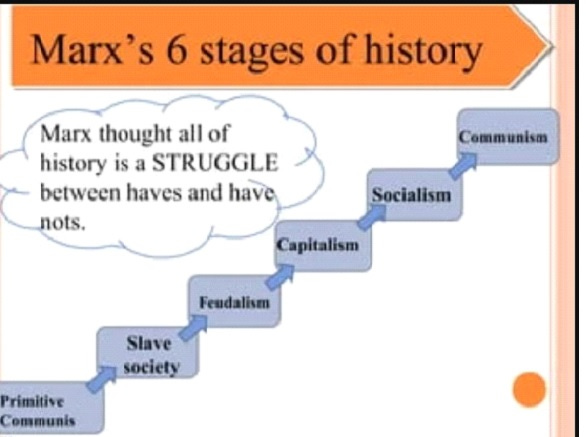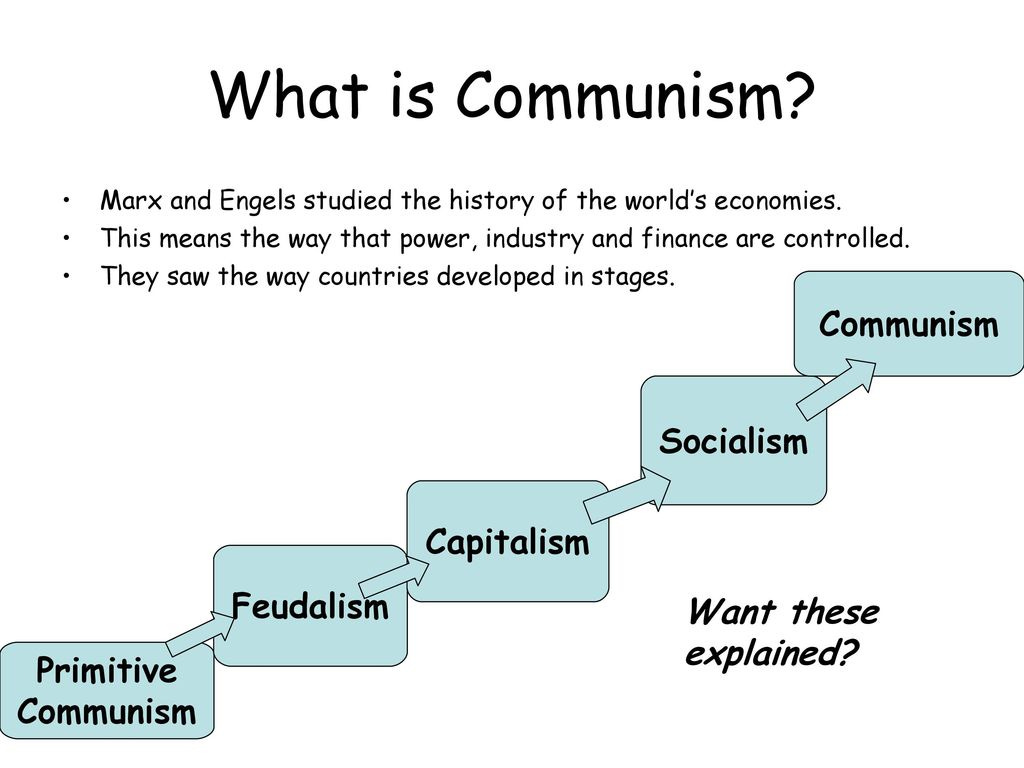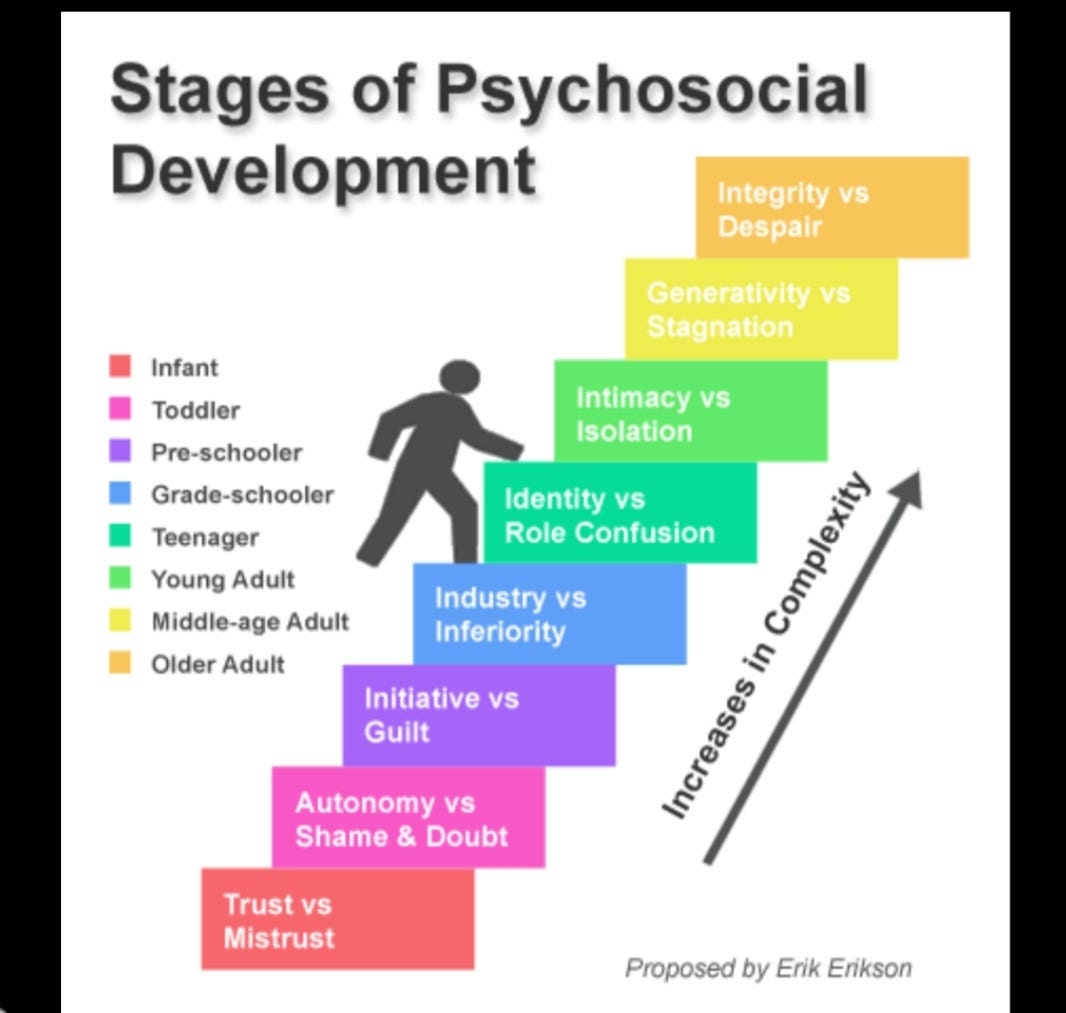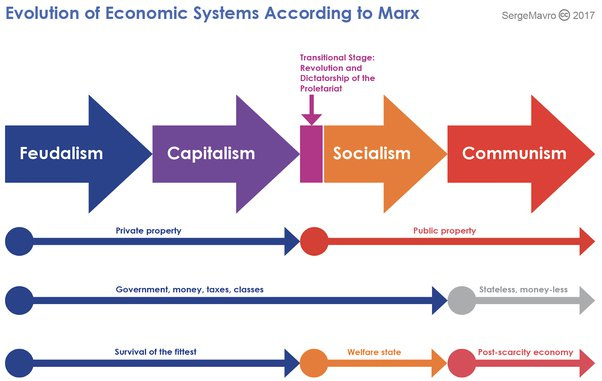This is part 3 in a series on labor exploitation in the mental healthcare industry.
Erik Erikson May Have Stolen Ideas From Karl Marx
A client of mine told me recently that the child-parent therapy she’s doing separate from our work, is focused on helping her child get through “unresolved stages” of earlier development. Her child was put into foster care when her drug addiction sent her to rehab for a long time. The child-parent therapist has explained that the kid is basically “stuck” in an earlier phase of development, which means he needs extra support from his mom today, so he can mature in a healthier, more adaptive way.
Theoretically, this therapist is relying explicitly on some version or interpretation of Erik Erikson’s theory of psychosocial development.
Erikson’s theory posits that humans throughout the lifespan encounter inner conflicts triggered by external social events, which they must struggle through and overcome in order to mature to the next stage. The show Arrested Development is all about silly, immature people, in reference to a phrase describing someone “stuck” in an earlier phase of development.
Did you know that Erikson’s stagelike theory of human development may have been inspired by Karl Marx’s stagelike theory of “historical materialism”?

Marx’s theory of historical materialism argued that societies develop over time due to a battle of internal conflicts within society between the haves and the have-nots (classes in conflict with each other), and as these conflicts resolve themselves they give birth to and synthesize new political-economic structures of society. Erikson’s psychosocial theory can be though of as a kind of evolutionary theory of individual human development, whereas Marx’s historical materialism theory theorizes evolution of human societies as they pass through different economic modes of production.
Each “mode of production” is defined largely by who owns versus who works within the economy of each society, and once we wrap our minds around the evolutionary processes across modes of production, we can understand what this big word “socialism” really means. Because on paper, socialism is often defined as “workers owning the means of production,” but without an understanding of historical materialism this concept is relatively meaningless.
Understanding “Socialism” As An Evolutionary Process Through Modes of Production
I heard a podcaster summarize historical materialism and socialist theory once by saying “you have to go through capitalism to get to socialism.” People in recovery and we as therapists might often agree with statements like: you have to hit rock bottom to start making serious changes in your life; it has to get worse before it gets better; you have to get through the pain to really begin to heal. (As an EMDR therapist I sometimes tell people that while it feels counterintuitive to go directly to painful memories and feel the pain associated with them, it’s similar to how you have to get sore to build muscles when you work out.) So we should understand having to “go through capitalism to get to socialism” not as an endorsement of capitalism, but as a conceptualization of socialism as part of an unraveling social, political, historical evolutionary process.
There are plenty of critiques of Marx’s stagelike theory of historical materialism, and they’re all worthwhile. But I think generally, as a conceptual framework that explains how we even got to capitalism, how we might get to socialism, and how we might eventually even get to communism (maybe lightyears into the future?), the evolutionary stages explanation is extremely helpful. Let’s try to understand them, so we can understand the concept of socialism later into this article.
The Stages

Primitive communism was the stage of pre-agriculture, when for tens of thousands of years humans lived in much more egalitarian, small, simpler (and often brutal by our standards) lifestyles compared to what came later. The word primitive isn’t supposed to mean “worse” or “less than,” it really should be thought of as primary or original. The original economic mode of production. This was a time, according to Marx, before serious class divisions were developed which is why it’s considered “communism.” The phrase primitive communism could be translated just as “the original communism,” because Marx’s vision of the communist future was essentially a return to a time when there were no class divisions, but only after evolving through all the hierarchical stages that class societies developed. To understand what he means by class divisions, let’s move on to the other stages.
Slavery was the first majorly class-divided society in that a ruling class emerged after the development of agriculture — a bunch of people grew food and generated a surplus (extra) and a small group of people owned and controlled the surplus. Rulers of slave society not only controlled the surplus produced by slaves, but they owned the slaves themselves. They controlled the labor process entirely: deciding what would be produced, where and when, whether to use or distribute or trade the product that workers produced. And we actually know based on historical and archeological data that slavery emerged independently in Mesopotamia (Syria, Iraq), Ancient Egypt, Classical Greece, the Roman Empire, Ancient India, Ancient China, and Mesoamerican cultures such as the Aztecs and Incas. The concept of class in this so-called mode of production means basically that an antagonistic master-slave relationship was born. Some people owned and controlled other people, forced them to do work that would benefit the owners, and the masters of this society ultimately controlled all aspects of society by controlling the economy.
The linear model of slavery evolving into feudalism through human history is a bit shaky based on evidence around the world, but it was very true in Europe. When the Roman Empire collapsed, most of Europe evolved into feudal kingdoms which usually didn’t have much or any official slavery, and the majority of people were instead considered to be “serfs.” Serfs were basically just peasant farmers and other kinds of workers who were bound to the land, more or less forced to work for their rulers, and had no say in anything in society similar to slaves. Serfs weren’t bought and sold like slaves, but were almost just like permanent fixtures across vast feudal estates where Kings and Queens, and so-called Lords, directed the serfs to do farming, make weapons for the army, build castles, brew beer, clean feudal estates, provide entertainment, etc. You can see clearly in the feudal mode of production how although there isn’t a master-slave relationship, the lord-serf relationship is extremely similar — in some ways almost identical.
Hundreds of books have been written about the exact way that European feudalism evolved into modern capitalism, so Google around for more if you really want to go deep. For our purposes, we just need to know that this evolution happened: feudalism evolved into capitalism. The key reasons are that a merchant class once subservient to the feudal ruling class, had at one point built more wealth and power than that ruling class, then overtook it. The merchant class — capitalists — became the new ruling class of not just Europe but the world. There are many complicated details covering the centuries of this transition, and part of the story is that in the earliest phases of this transition was something Marx called primitive accumulation, which we might translate as “the original source of capitalist money and power.” Like, if we’re to look at all the billionaires of the world today and ask where all their money came from, Marx would have us look not just at their businesses, how they dodge taxes, competitive dynamics across their giant international firms, or even wealth passed down from their parents and their parents. (Looking to intergenerational wealth would get us closer to understanding everything, but not close enough.) He would ask us to look at where all the original money came from. How is it, in capitalism, that some fixed amount of money — let’s say one million dollars — could possibly “grow” into fifty trillion dollars? Marx developed fascinating theories and explanations of the internal mechanisms and dynamics of capitalism that we don’t have time for here, because we’re just covering historical materialism.
The primitive accumulation process included the European conquering of indigenous lands and people, the conversion of people into slaves and later wage workers and the transformation of natural resources into commodities. Slavery and colonialism during this early phase of capitalism were not isolated modes of production in themselves, but instead primitive accumulation tools that enabled capitalism to eventually evolve into what it is today. Put another way, the merchant class of Europe consolidated its power through violently seizing the means of economic production all over planet Earth. The “means of production” should be understood as the land, the natural resources, and most importantly the labor. Whereas most conquering in previous modes of production came from religious and ethnic justifications, such as “we the great Roman People have the divine right to enslave everyone and promote our great way of life,” the emergence of a capitalist class as ruling class began to justify global seizure of land, resources, and people as a way to accumulate profit. You invest some amount of money into building factories, you pay the workers the lowest wage possible, you sell the commodities they produce at the highest price, and you turn small amounts of money into large amounts of money. The more factories around the world you own, the more profit you accumulate. So the primitive accumulation process secured the capitalist class’s capacity for what evolved into nearly totalistic global political economic control, into a completely normalized employer-employee antagonism that everybody in society just considers to be “the way it is.” By the time we historically arrive at the dirty, dangerous, polluting factories of the 1800s in London and through Europe, and copy-pasted through the rest of the world, workers have nearly accepted that slavery and feudalism are gone and now there’s a situation where there’s a handful of ultra-rich capitalists who own everything, and they pay you just a tiny bit of money in exchange for labor that makes them infinitely richer.
Where does “socialism” fit into the long arc of historical materialist theory?
Marx’s groundbreaking writings emerged in the mid-late 1800s, when the industrial revolution throughout Europe was in full force. At this time, the “socialist movement” was in its earliest stages, and it’s important to understand that Marx did not invent “socialism.” Similar to how Erikson or any other psychological or psychotherapeutic theoretician might just observe human processes and try to explain them, Marx just wanted to understand why and how capitalism came about. Simultaneously, there were worker revolts, labor strikes, militant fights for more democracy, more economic redistribution, and an overall better society. He was smack dab in the middle of a movement, a moment in history, just trying to understand what was happening.
In all his theorizing around historical materialism up to what I’ve described, he then ventured into what some would call utopian thinking, although he and others coming from his line of thinking thought they were being scientific in their analysis. Marx said: okay, history has evolved through these processes of class struggle from the original mostly egalitarian tribal days, toward slavery, toward feudalism, and into what’s now considered capitalism. He read Adam Smith and other economists of his time, he tried to understand their conceptualization of capitalism as the sort of ultimate peak of human development. The maximal human capacity for freedom, liberty, justice, and so on. (Remember that the capitalists of Europe during feudalism were the progressives; moving Europe and world away from the divine right of kings, away from feudalism, toward secularist analysis and open debate, toward some form of democracy, and toward a wage-based system instead of slavery and feudalism, was extremely radical.) He concluded, looking at the socialist and workers movement around him and decided that capitalism was not the final stage of history— far from it!
So he began to conceptualize socialism and eventually communism as further evolutionary stages of historical materialist development.
Socialism defined
Socialism is when the “workers own the means of production,” and this phrase should mean a lot more now that we’ve moved through all the other bits of historical materialism. For all of history — except during “primitive communist” times — there was a ruling class who owned, managed, directed the labor processes of society. They owned fruits of workers’ labor, and owned the workers themselves. They did it with slavery, with feudalism, and now they’re doing it with capitalism. In each of these previous modes of production, workers were exploited against their will based on the interests, needs, desires of a small group of people who evolved from slave masters to feudal lords to global capitalists as part of an evolutionary process.
So the vision of socialism is the vision of an end to this exploitative framework of slavers, lords and capitalists owning and controlling society. Instead, those who produce all the goods and services of society will, in socialism, develop structures of collective ownership and democratic decision making about all aspects of production, in regard to society’s productive forces, for the collective self-interest of everyone instead of for a small few who claim higher status due to their relationship to God, or bloodline, or wealth.
It’s hard for us in the current capitalist system, due largely to the “capitalist realism” mood and ideology we’ve found ourselves in, to imagine exactly what this future socialist society would look like. Imagining how we organize ourselves into social formations capable of transitioning society from capitalism to socialism is even harder. What exactly would it take for us to move from capitalism to socialism? Like, in concrete, methodological terms, with some kind of timeline and a step by step task-list, what would we actually do?
Before diving into the mechanics of how we get to socialism, let’s cover the sort of “final stage” of Marx’s theory of development: communism.
Communism
Communism has been defined as a far into the future “stateless, classless, moneyless society.” Whenever people say things like “communist Russia” or “communist China,” we know what they mean but they’re usually demonstrating a misunderstanding of historical materialist theory. There have been many communist parties especially in the 1900s, and into the 2000s as well. Communist parties are called communist not because if they gain power they will suddenly implement “communist policies,” turn the society into a “communist society,” or engage in “communist rule.” Leaders of every communist party in the world tend to be educated in Marxist and socialist theory, which includes historical materialism. The phase communism in these contexts is to name an eventual horizon for humanity which may take 1,000 years. Communists tend to want to transition humanity from capitalism into socialism as a transitional stage, which will eventually evolve into communism.
When you read the writings of Chinese Communist Party (CCP) leaders, whether it’s Xi Jengping’s 2014 four-part series The Governance of China, or previous leaders such as Deng or Mao, you’ll find constant references to stages of history, to modes of production, and most relevantly their conceptualization of China being in an early stage of socialism and nowhere near communism. Chinese communists generally believe that China as a nation began its journey toward socialism in the late 1940s and early 1950s, but that even today in modern times they are still within an early stage of socialism. It’s beyond the scope of this piece to get into what the various stages of socialism might be, and I think for every society and country the details here will be different.
In conclusion
This is just scratching the surface of socialist theory and history, beginning with Marx’s theoretical concept of historical materialism. It was a radical idea when it first entered popular consideration in the mid-late 1800s, and it’s still a radical idea today. What makes it so radical is it rejects the idea that history unfolds randomly from decisions God makes for us all, or that “the universe” just makes happen through mystical processes, or that Great Men shape history through Great Big Ideas.
Since I wanted this series to mainly land on a readership mostly comprised of fellow psychotherapists, I wanted to explain historical materialism as a stagelike theory similar to Erik Erikson’s psychosocial theory of development. I don’t think therapists have conceptualized history in this way because in the West we tend not to have much (or any) exposure to Karl Marx’s ideas, or to anything akin to mature socialist theory.
It’s become hard for me to keep writing for this series, in part because when I’m not working as a therapist I’m doing socialist activism stuff and it’s all pretty time consuming. But I’d like to keep going with the series, and in this moment I’m thinking of the next part having to do with Marx’s theoretical concept of Dialectical Materialism. I have some basic drafts of this already saved that draw a bit on Marsha Linehan’s Dialectical Behavioral Therapy (DBT) so therapists can come to understand the dialectics piece Marx relied on so much. Dialectical materialism and historical materialism are like two foundational puzzle pieces of Marxist thought that really go together, so it’s important to understand them both together.
What I’d like to achieve in this series at some point, if this hasn’t been achieved already, is for therapists who drift into realizing they appreciate socialist theory and may themselves identify as socialists, to begin asking themselves whether they’re doing anything in their lives that is evolving society from capitalism toward socialism. I’ll make the claim here that nothing we do in the therapy room moves society toward socialism, which some will find controversial or offensive or too negative. But it’s what I believe. At some point in the series I want to address the question: how can therapists join the socialist revolution, toward a transition away from capitalism? Let’s hope I actually get there!
Thanks for reading, and let me know what you think in the comments!






I know it's pedantic of me but light-years is a measurement of distance not time.
As a recently graduated psychotherapist who is delving into marxism, I stumbled onto this and am so glad that I did! I am fascinated by the ways psychotherapists can organize together and advocate against capitalism that is inflicting so much of the mental health issues that folks are struggling with. Thank you for this piece!